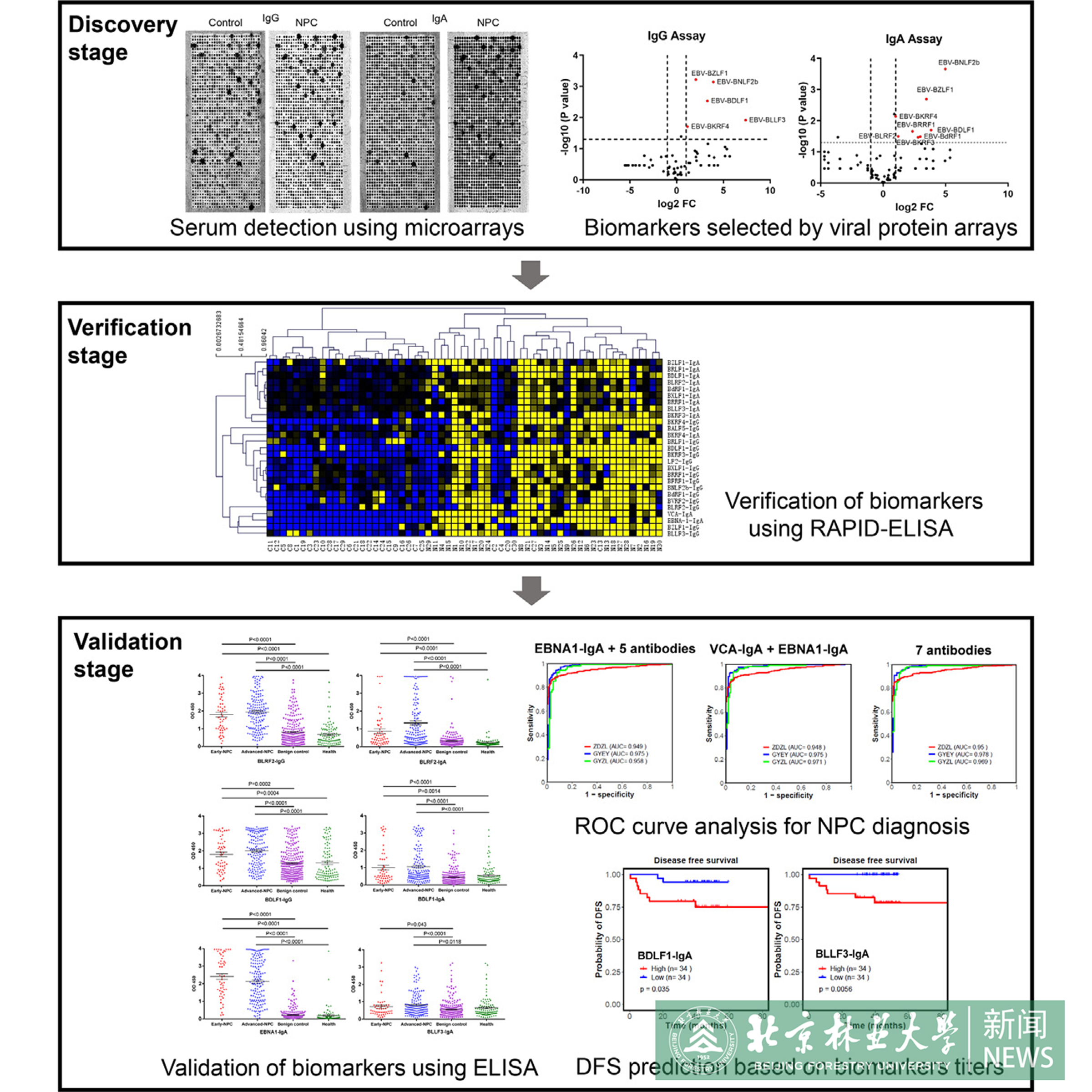Latest news
Recently, Liang Te, a youth teacher from the College of Forestry, collaborated with research teams from the National Protein Science Center, the Second Affiliated Hospital of Guangzhou Medical University, and Sun Yat-Sen University Cancer Center. Their research paper, published in the prestigious proteomics journal Molecular & Cellular Proteomics (IF=7), is entitled "Antibody profiling of pan-cancer viral proteome reveals biomarkers for nasopharyngeal carcinoma diagnosis and prognosis." The study identifies potential serum antibody biomarkers for diagnosing and predicting the prognosis of nasopharyngeal carcinoma, with promising applications in diagnosing and monitoring virus-related infectious diseases in wildlife.

Diagnosing, predicting disease outcome, and identifying effective treatment targets for virus-related cancers are lacking. Protein biomarkers have the potential to bridge the gap between prevention and treatment for these types of cancers. While it has been shown that certain antibodies against EBV proteins could be used to detect nasopharyngeal carcinoma (NPC), antibodies targeting are solely a tiny part of the about 80 proteins expressed by the EBV genome. Furthermore, it remains unclear what role other viruses play in NPC since many diseases are the result of multiple viral infections. For the first time, this study measured both IgA and IgG antibody responses against 646 viral proteins from 23 viruses in patients with NPC and control subjects using nucleic acid programmable protein arrays. Candidate seromarkers were then validated by ELISA using 1665 serum samples from three clinical cohorts. We demonstrated that the levels of five candidate seromarkers (EBV-BLLF3-IgA, EBV-BLRF2-IgA, EBV-BLRF2-IgG, EBV-BDLF1-IgA, EBV-BDLF1-IgG) in NPC patients were significantly elevated than controls. Additional examination revealed that NPC could be successfully diagnosed by combining the clinical biomarker EBNA1-IgA with the five anti-EBV antibodies. The sensitivity of the six-antibody signature at 95% specificity to diagnose NPC was comparable to the current clinically-approved biomarker combination, VCA-IgA, and EBNA1-IgA. However, the recombinant antigens of the five antibodies are easier to produce and standardize compared to the native viral VCA proteins. This suggests the potential replacement of the traditional VCA-IgA assay with the 5-antibodies combination to screen and diagnose NPC. Additionally, we investigated the prognostic significance of these seromarkers titers in NPC. We showed that NPC patients with elevated BLLF3-IgA and BDLF1-IgA titers in their serum exhibited significantly poorer disease-free survival, suggesting the potential of these two seromarkers as prognostic indicators of NPC. These findings will help develop serological tests to detect and treat NPC in the future.
Youth teacher Liang Te from the College of Forestry is the first author of the paper, and Beijing Forestry University is the signature unit of the first author.This work was supported by the National Key R&D Program of China (2021YFA1301604, 2021YFC2600400, 2022YFE0210400, 2020YFE0202200, and 2023YFC0872400), the Fundamental Research Funds for the Central Universities (BLX202103), Beijing Municipal Natural Science Foundation (L234034, M23010 and M21003), Guangzhou Health Science and Technology Project (20201A011078). Guangzhou Science and Technology Project (202102010094, 2020B1111100006), and Guangdong Basic and Applied Basic Research Foundation (2021A1515012550). State Key Laboratory of Proteomics (SKLP-O202205 and SKLP-O202007), Innovation Team and Talents Cultivation Program of National Administration of Traditional Chinese Medicine (No: ZYYCXTD-C-202204).
Written by Liang Te
Translated and edited by Song He
Reviewed by Yu Yangyang










